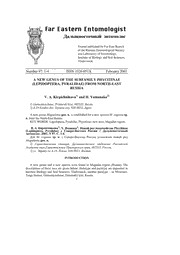
A new genus of the subfamily Phycitinae (Lepidoptera, Pyralidae) from North-East Russia PDF
Preview A new genus of the subfamily Phycitinae (Lepidoptera, Pyralidae) from North-East Russia
Number 97: 1-4 ISSN 1026-051X February 2001 A NEW GENUS OF THE SUBFAMILY PHYCITINAE (LEPIDOPTERA, PYRALIDAE) FROM NORTH-EAST RUSSIA V. A. Kirpichnikova1) and H. Yamanaka2) 1) Gornotayozhnoe, Primorski krai, 692533, Russia 2) 4-18 Eiraku-cho, Toyama city, 930-0853, Japan A new genus Magadania gen. n. is established for a new species M. cognata sp. n. from the North-East Russia. KEY WORDS: Lepidoptera, Pyralidae, Phycitinae, new taxa, Magadan region. В. А. Кирпичникова1), Х. Яманака2). Новый род подсемейства Phycitinae (Lepidoptera, Pyralidae) с Северо-Востока России // Дальневосточный энтомолог. 2001. N 97. С. 1-4. Для M. cognata sp. n. с Северо-Востока России установлен новый род Magadania gen. n. 1) Горно-таежная станция, Дальневосточное отделение Российской Академии наук,Горнотаежное Приморского края, 692533, Россия. 2) ул. Эйраку-чо 4-18, Тояма, 930-0853, Япония. INTRODUCTION A new genus and a new species were found in Magadan region (Russia). The descriptions of these taxa are given below. Holotype and paratype are deposited in Institute Biology and Soil Sciences, Vladivostok, another paratype – in Mountain- Taiga Station, Gornotayozhnoe, Primorskii krai, Russia. 1 Genus Magadania Kirpichnikova et Yamanaka, gen. n. Type species - Magadania cognata, sp. n. SPECIES INCLUDED. Type species only. EXTERNAL CHARACTERS. Male. Labial palpus long, porrect, projecting about three times the length of head. Maxillary palpus short, slender, slightly scaled. Frons nearly flat, evenly scaled. Vertex with a bunch of brush-like long scales near base of antenna. Antenna filiform, scape broad, flagellum minutely ciliated, and several basal segments weakly curved. Proboscis, ocellus and chaetosema developed. Forewing with 11 veins. Vein R well separated at base 2 from R and R , R and R stalked for about half their length, M from upper 3+4 5 3+4 5 1 angle of cell, M and M shortly approximated, Cu from slightly before lower angle 2 3 1 of cell, Cu from well before lower angle of cell. Hindwing with 7 veins. Vein Sc 2 and Rs shortly anastomosed beyond cell, M and M stalked for about half their 2 3 length, the stalk connate with Cu , Cu from well before lower angle of cell. 1 2 Length of cell about one-third length of wing. MALE GENITALIA. Uncus triangulate, apical margin broadly rounded, dorsal setae absent. Apical process of gnathos small consisting of an inverted U-shaped plate, with a small hook at its tip. Transtilla absent. Clasper absent. Valva short, narrow, basal two-thirds of costa strongly sclerotized and weakly curved dorsad; terminal margin of cucullus symmetrically rounded. Vinculum broad, strongly sclerotized, and nearly equal in length of greatest width, tapering, terminal margin slightly concave. Juxta represented by two pairs of slender arms, two medial arms longer than lateral ones, their tips bluntly pointed. Aedeagus slender, nearly equal in length of valva, its basal portion more or less strongly sclerotized and slightly inflated, no cornuti. ETYMOLOGY. This genus is named after its type locality, Magadan region in Russia. REMARKS. New genus is similar to Hypochalcia Hübner, [1825] (type species - Tinea ahenella [Denis & Schiffermüller, 1775]) in the male venation of both wings and the shape of labial palpus, but characters of male genitalia are different from those of Hypochalcia. Magadania cognata Kirpichnikova et Yamanaka, sp. n. Figs 1-5 MATERIAL. Holotype: ♂, Russia: Magadan region, Kulu River, 23.VII 1987 (V. Kirpichnikova). Paratypes: 2 ♂, Magadan region, 39 km from Sibit-Tyellakh, 8.VII 1987, 13.VII 1987 (Yu. Tshistjakov). DESCRIPTION. MALE. Expanse 30-32 mm. Labial palpus brown, first and second segments mixed with whitish scales ventrally. Maxillary palpus brown. Frons brown. Brush-like long scales of vertex white. Antenna brown. Legs creamy 2 Figs 1-5. Magadania cognata, sp. n.: 1) head, lateral view; 2) venation of fore wing; 3) venation of hind wing; 4) male genitalia, ventral view; 5) aedeagus. brown, rather mixed with blackish scales. Forewing above greyish brown or dark brown, costal area narrow, slightly suffused with greyish scales, terminal area more or less strongly tinted with dark brown, with longitudinal blackish stripes along veins and a series of black spots along termen. Antemedial line blackish brown, expanding near costa. Postmedial line white, slightly curved outward and narrowly edged with blackish brown on outer and inner edges. Discal spot absent. Cilia brown. Hindwing above uniformly brown. Cilia concolorous with forewing. Both wings beneath paler than on above, and markings of forewing weakly repeated. 3 MALE GENITALIA. As described for the genus. FEMALE. Unknown. DISTRIBUTION. Russia: Magadan region only. ECOLOGY. New species was collected near «Aborigen» and «Stokovii kontact» Biological Stations: valleys of Sibit-Tyellakh and Kulu Rivers, upper Kolyma basin, on elevations from 300 to 1250 m, in the localities occupied by growth of Pinus pumila, Larix sp., Betula sp. and Alnus sp. on scree slopes and mountain tundra. ACKNOWLEDGEMENTS The authors wish to express their thank to Dr Yu. Tshistjakov (Vladivostok), for his gift of the valuable specimens and Mrs. T. Repina (Mountain-Taiga Station) for her drawing of the illustrations. _________________________________________________________________ Far Eastern entomologist (Far East. entomol.) Editor-in-Chief: S.Yu. Storozhenko Editorial Board: A.S. Lelej, Yu.A. Tshistjakov, N.V. Kurzenko Address: Institute of Biology and Soil Sciences, Far East Branch of Russian Academy of Sciences, 690022, Vladivostok-22, Russia. FAX: (4232) 310 193 E-mail: [email protected]
